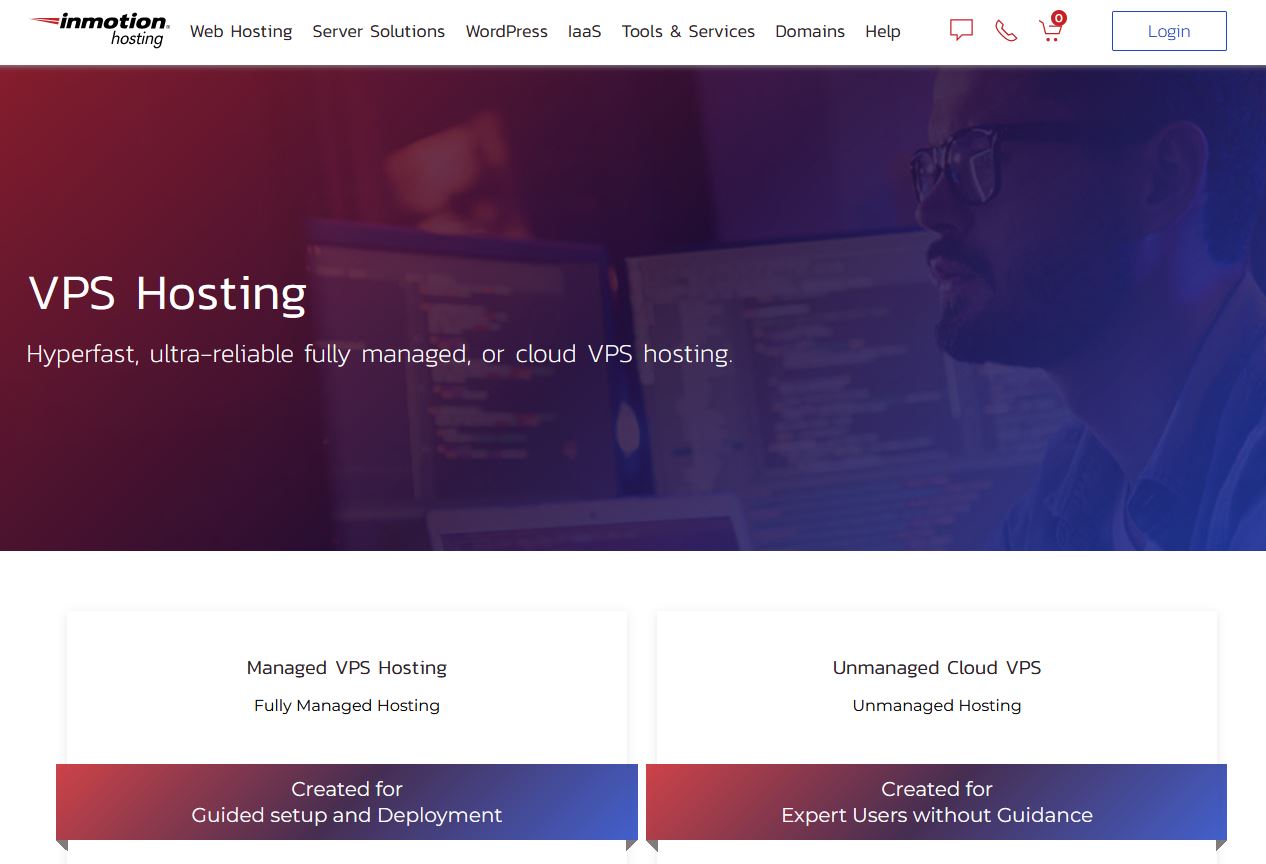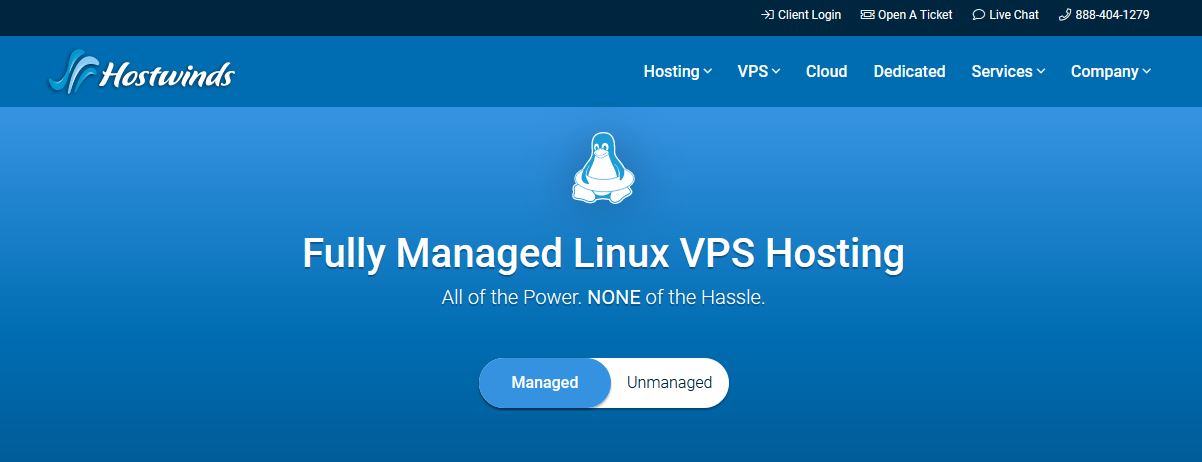Standard shared web hosting packages are cheap and user-friendly, but they're also slow, inflexible, and don't have the power or functionality that professional and business users often need.
1. Hostgator
2. Bluehost
3. Inmotion
4. Hostwinds
5. Liquid Web
If you need more than a basic host but can't afford a dedicated server or don't want to deal with the complexity of these beasts, VPS (Virtual Private Server) hosting could be a smart choice.
Buying a VPS plan means that you get your very own virtual server environment. You have full control over the operating system, the extensions and apps you install, and all their settings. Each physical server will still host multiple VPS customers, but not as many as with shared hosting, and typically each VPS will be allocated a share of key resources – RAM, storage space, CPU cores – for their use alone.
This can be easier to manage than you might think. Many VPS plans include standard tools like cPanel to help monitor and configure your site. Some hosts will manage the service for you, monitoring for problems like a crashed service, and fixing them as soon as they're detected.
VPS prices and specs vary from a few dollars a month to hundreds, depending on your requirements. There's a lot of choice out there, but don't panic – our list of five best VPS providers will point you in the right direction.
- Our list of the best web hosting solutions is also worth a read

Hostgator delivers an impressive range of hosting services, ranging from domains to dedicated servers at very competitive prices and backed by a 99.9% uptime guarantee. This applies as much to their VPS hosting as any of their other hosting options.
Hostgator offer three specific VPS hosting plans, starting with the Snappy 2000, which comes with 2GB RAM, 2 cores of CPU, and 120GB of diskspace. The allocations are generous and should accommodate all but the most demanding websites.
An upgrade from that, if required, is the Snappy 4000, which upgrades RAM to 4GB and storage to 165GB. For more demanding sites that don't yet require their own server, you can opt for the Snappy 8000, which comes with 8GB RAM, 4 cores CPU, and 240 GB storage.
Pricing depends on whether you pay monthly or commit to one of their annual plans. For example, the Snappy 2000 VPS hosting plan costs $29.95 if you only want to pay from month to month, but if you commit to a 3-year contract it comes down as low as $19.95 a month.
Additional benefits include a 45-day money-back guarantee, not to mention free transfers for new accounts within the first month after you’ve signed up. There’s lots to like here considering the minimal impact on your wallet, if you're happy to commit.

Bluehost has been around for quite some time and always offered powerful plans for a variety of users, and their VPS range is no different.
You have three plans to choose from, with the cheapest plan starting at $17.99 per month for the first term and $29.99 per month on renewal. That gets you 2 CPU cores (2x Xeon Gold 5220), 30GB SSD storage, 2 GB RAM, 1 TB bandwidth and one IP address. The top-tier plan called Ultimate, gives you 4 CPU cores (2x Xeon Gold 5222), 120GB SSD storage, 8 GB RAM, 3 TB bandwidth and two IP addresses, and it’s priced at $57.99 per month for the first term and $119.99 per month on renewal.
All plans come with a free SSL certificate and a 1-year domain. You also get unlimited subdomains and email accounts, and cPanel is included too. Domain privacy and protection, and SiteLock are categorized as optional add-ons, so you’ll have to pay extra if you need them.
Support is available 24/7 so if you encounter any difficulties you’ll be able to call them at any time of the day. All in all, Bluehost is a capable provider for both newbies and experienced users so they are definitely worth a try.

Check out a few VPS hosting providers and it's easy to be tempted with low headline rates, but don't be fooled – companies use a range of tricks to keep their charges down.
The hardware specs of a starter product are often kept unrealistically low, for instance, to keep the price right down. Important items – backups, cPanel – may be expensive extras. And even then, the headline rate may only apply if you pay for two or three years upfront, increasing dramatically on renewal.
InMotion Hosting is refreshingly different. Its baseline VPS-1000HA-S plan doesn't have the most eye-catching price at $22.99 per month over three years, but it's easy to see why the company asks this much. The product has a better specification – 4GB RAM, 75GB storage, 4TB bandwidth, 3 dedicated IPs – than some high-end plans from other providers, backups and a cPanel licence are included for free, and there's a 90-day money-back guarantee.
There's an unusual feature in what InMotion calls "unlocked CPU cores". Rather than having access to one or two cores only, you're able to spread your processing load across all cores on the server, a major performance boost for tasks involving a lot of simultaneous processing.
Welcome bonus touches include a feature called Launch Assist, which essentially means you get two hours of free time with one of InMotion's server administrators. Whether you need to change domain settings, configure cPanel, migrate WordPress or database files, they can help you get the job done.
Put it all together and you're getting a very capable set of VPS hosting plans. If you'd prefer a package that comes with unexpected surprises, rather than hidden catches, we'd give InMotion a try.

Some VPS hosts focus on first-time users, others go for big business, but Hostwinds does its best to appeal to everyone. This means offering both managed and unmanaged plans.
Additionally, along with support for the usual Linux variants – CentOS, Ubuntu, Fedora, Debian – you can choose Windows Server 2008, 2012 or 2016 for only a $5 a month premium. That's very good value, and if you're more familiar with Windows than Linux, it could save you from lots of management hassles later on.
Managed Linux VPS plans start from $8.24 for 1 core and 1 GB RAM, which is a little low but decent for starter websites, with plans increasing resource allocations at a reasonable pricing rate.
For unmanaged Linux, plans start from just $4.99 for the same 1 core and 1GB RAM spec. However, there are far more VPS hosting plans available for unmanaged Linux, with the top tier offering as much as 16 cores and 96 GB of RAM.
Windows plans follow a similar pattern, though for managed VPS with a single core and 1 GB RAM pricing starts a little more at $12.74. Unmanaged options are similar in terms of specs to the unmanaged Linux, though pricing again is a little higher at $10.99 a month.
Whichever you're after, Hostwinds offers plenty of choices.

Liquid Web is a premium web hosting provider which has been offering top quality managed solutions for more than 20 years, and now handles 500,000 sites for more than 32,000 customers worldwide.
The company doesn't try to beat the competition on price, instead focusing on delivering comprehensive products which will deliver quality results.
The cheapest Liquid Web plan may cost $59 a month (you can reduce that to $30 a month by going annual), for instance, but that gets you 2GB RAM, 40GB storage, a very generous 10TB of bandwidth, and 100GB backup.
There are lots of configuration options. Instead of just telling you that you're getting CentOS 7, Liquid Web allows you to select CentOS 6, Debian 8, Ubuntu 14.04 or 16.04, and often with multiple options of their own: cPanel, Plesk, CloudLinux and more.
This is a managed product, too. Liquid Web fully supports the base operating system, and the support team will proactively restore failed services as soon as they're detected. Getting a managed VPS with other providers could cost you an extra $30 a month, or more.
If your VPS still has issues, there's speedy 24x7x365 support from knowledgeable professionals who will do their best to solve your problems at speed.
Liquid Web may not have the most appealing headline prices, but it's still cheaper than many others considering the features you get, and the excellent support will help keep your site running smoothly down the line.
- We consider the merits of shared hosting vs VPS hosting here.
No comments:
Post a Comment